ADP is one of the best payroll service providers for businesses planning to expand and hire more employees in the near future. It has advanced HR features, like new hire onboarding and background checks, on top of its full-service payroll and tax services. However, ADP might not be ideal for some organizations like those with a tight monthly budget or those that don’t need robust HR features.
If you are looking for an alternative, we evaluated 15 ADP competitors and narrowed them down to the top eight.
- Gusto: Best overall ADP competitor for small businesses
- QuickBooks Payroll: Best for small business QuickBooks accounting users
- TriNet HR Platform: Best for companies in heavily regulated industries
- Paychex: Best for solopreneurs and growing businesses looking for dedicated support
- Square Payroll: Best for restaurants, retail shops, and Square POS users
- Paycor: Best fully configurable payroll tool for complex salary calculations
- Justworks: Best for businesses that need a reasonably priced PEO
- Rippling: Best for tech-reliant companies needing integrated HR, payroll, and IT tool
Top ADP Competitors Compared
Starter Pricing | Payroll | Time Tracking | Our Score (out of 5) | ||
|---|---|---|---|---|---|
 | 3 months free payroll | ✓ | Paid add-on (custom-priced) | 4.31 | |
$49 per month + $6 per person per month | ✓ | Included in higher tiers | 4.87 | ||
1 month free trial | $6 per employee + $45 base fee | ✓ | Included in higher tiers | 4.53 | |
 | 14 days free trial | $10 per employee monthly | $6 per employee | ✓ | 4.51 |
3 months free payroll processing | $5 per employee + $39 base fee | ✓ | ✓ | 4.34 | |
✕ | $6 per employee + $35 base fee | ✓ | ✓ | 4.34 | |
50% off the base fee for 6 months | Custom-priced | ✓ | Paid add-on (custom priced) | 4.32 | |
✕ | $8 per employee + $50 base fee | ✓ | Paid add-on ($8) | 4.19 | |
1 month free access | $8 per user monthly | Included in monthly pricing | Call for a quote | 4.17 | |
Why You Can Trust Fit Small Business
Best ADP Competitor Quiz
Which ADP Competitor Is Right for You?”
Gusto: Best Overall ADP Competitor

Pros
- Reasonably priced plan
- Onboarding, basic hiring, and performance review tools available
- Wide variety of benefits option
Cons
- Inconsistent customer support quality
- No dedicated payroll specialist
Overview
Who should use it:
Small businesses needing help running payroll at a good value will find Gusto beneficial. The software handles payroll processing, tax compliance, and benefits administration on one platform, reducing manual work and potential errors. With employee self-service features and scalability to grow with businesses, Gusto is ideal for companies seeking effective payroll management without breaking the bank.
Why we like it:
We like Gusto because of its modern, intuitive interface. It offers features beyond basic payroll like time tracking, onboarding tools, and performance reviews. We also like its transparent pricing model with no hidden fees, which budget-conscious companies will appreciate. Its ability to handle contractor payments alongside employee payroll is a significant advantage for businesses with diverse workforce structures.
- Simple: $49 per month + $6 per person per month
- Plus: $80 per month + $12 per employee monthly
- Premium: Custom-priced
- Contractor-only payroll plan: $35 per month + 6 per contractor monthly
Add-ons
- State payroll tax registration: Pricing varies per state
- HR advisory services for Plus plan only: $8 per employee monthly (this is included for free in the Premium tier)
- You can use its online tools without any training required—provided you have a good background on how payroll works.
- It has how-to guides and unlimited phone, email, and chat support.
- It handles contractor payments in more than 120 countries.
- It has HR tools from onboarding to employee benefits, such as health insurance, worker’s comp, HSA, FSA, and even commuter benefits.
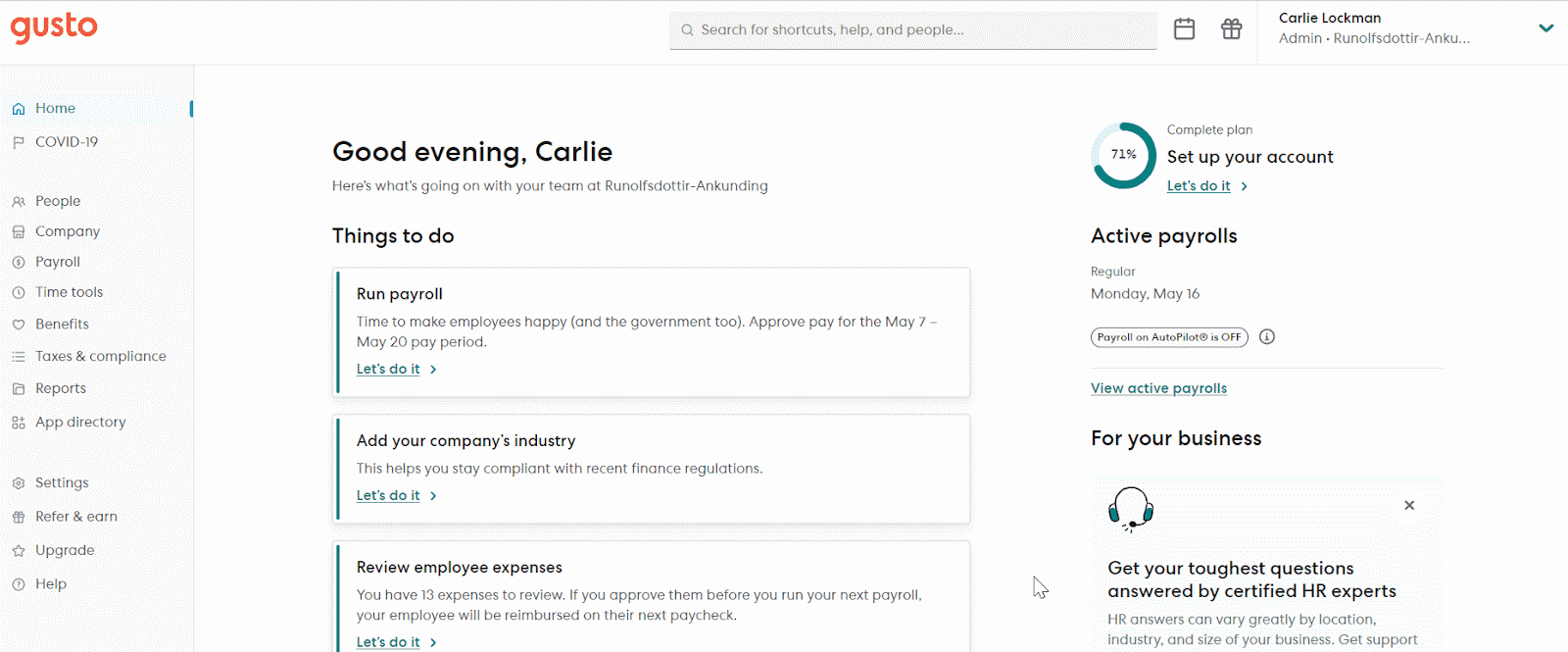
Gusto runs payroll in four easy steps. (Source: Gusto)
QuickBooks Payroll: Best for QuickBooks Accounting Users

Pros
- Unlimited payroll runs
- Seamless integration with QuickBooks accounting
- Same- and next-day direct deposits
- Robust tax penalty protection program, wherein QuickBooks will cover tax filing penalties (up to $25,000/year) regardless of who makes the mistake
Cons
- Tax penalty protection available only in its Elite plan
- Automated local tax filings included in higher tiers only
- Basic HR features only
- Inconsistent customer support quality
Overview
Who should use it:
QuickBooks Payroll is best for small businesses that need a straightforward payroll solution and have limited HR needs. It efficiently handles essential tasks, such as calculating wages, managing tax withholdings, and generating paychecks. QuickBooks Payroll is also particularly ideal for companies already using QuickBooks for accounting as the integration provides seamless financial management.
Why we like it:
While QuickBooks Payroll may not have the same extensive features as more comprehensive payroll systems, its streamlined approach is a significant advantage for small business owners because it only focuses on essential payroll functions. This not only saves time but also reduces the risk of errors that can occur in more complicated systems. Additionally, we like its tax penalty protection program that protects businesses from mistakes regardless of who made them.
- Core: $45 per month + $6 per employee monthly
- Premium: $80 per month + $8 per employee monthly
- Elite: $125 per month + $10 per employee monthly
- Contractor payments: $15 per month for up to 20 workers; plus $2 for each additional contractor
- It has intuitive controls that allow you to set up and run payroll in a few easy steps.
- QuickBooks Payroll is the only software in this article that provides next-day direct deposits in its basic plan.
- Its native integration with QuickBooks Accounting seamlessly transfers data between Intuit QuickBooks products, allowing your payroll information to flow directly to the general journal and use wage-related information for analytics and other reports using QuickBooks.
- Higher plans have an expert to help set up your payroll system.
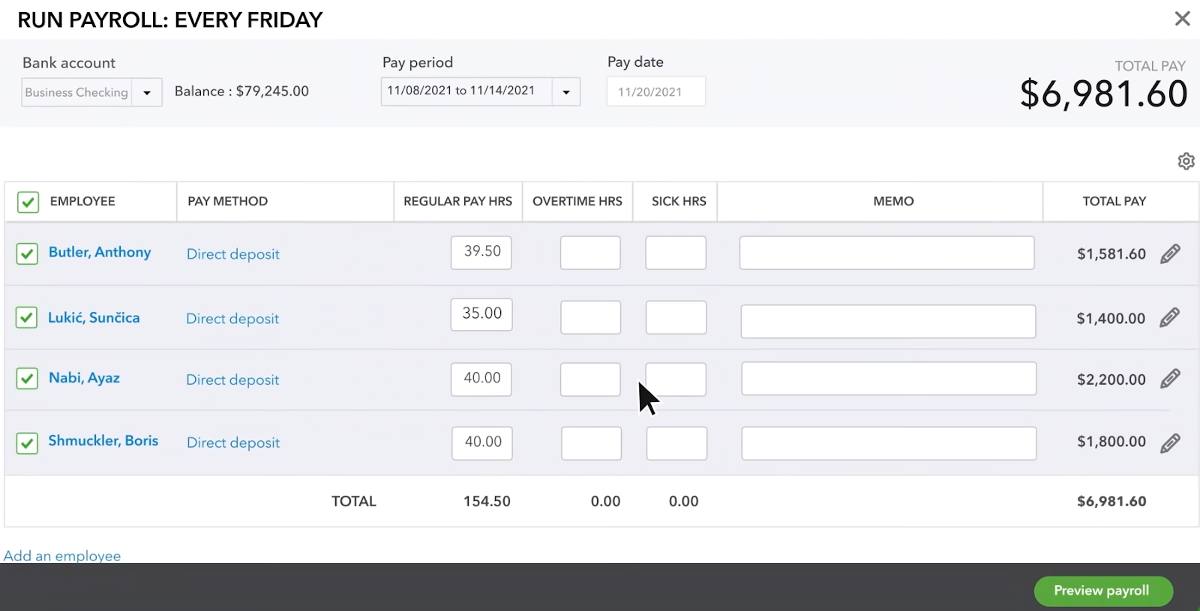
QuickBooks Payroll lets you add overtime and sick leave details directly into its payroll platform. (Source: QuickBooks Payroll)
TriNet HR Platform: Best for Heavily Regulated Industries

Pros
- Simple to use
- Unlimited pay runs
- Robust integration options
- Wide range of HR solutions
Cons
- Extra costs for payroll and HR/payroll expert advising
- A minimum of five employees required for base plans and add-ons
- Inconsistent customer support quality
- Health insurance limited to 49 states
- No dedicated payroll specialist
Overview
Who should use it:
TriNet HR Platform is an ideal HR solution for SMBs that face complex industry-specific compliance requirements and those that want to outsource their day-to-day human resource tasks. The company offers comprehensive HR services tailored to various sectors, including payroll processing, benefits administration, risk management, and regulatory compliance.
Why we like it:
We like TriNet’s comprehensive suite of services, including payroll management, benefits administration, and compliance assistance, all through a user-friendly platform. This allows companies to offload complex HR tasks, reduce administrative burdens, and access high-quality benefits.
- Essentials: $10 per employee monthly
- Growth: $20 per employee monthly
- Zen: $27 per employee monthly
Add-on tools and services All plans and add-ons require at least five employees
- Payroll: $6 per employee monthly
- Advisory services: $10 per employee monthly
- Benefits administration using own broker: $5 per employee monthly
- Recruiting: Starts at $62 monthly
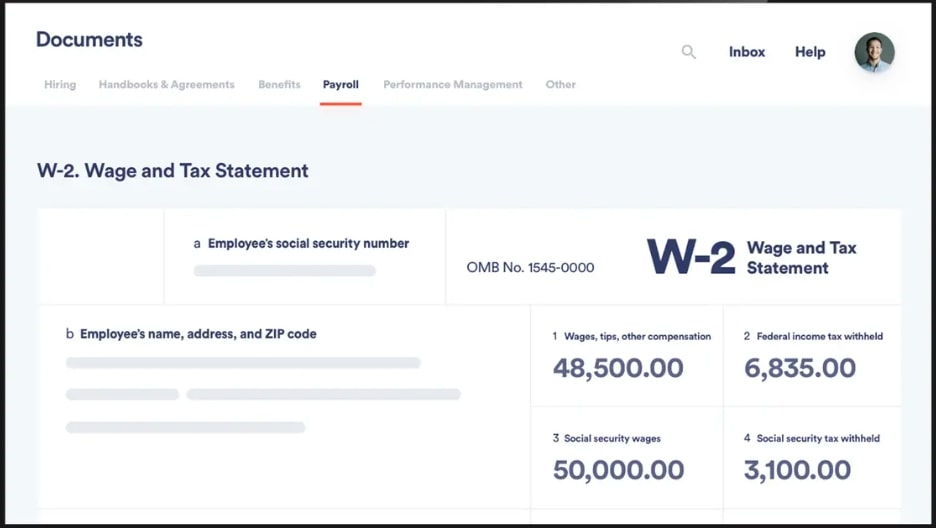
TriNet files and remits tax filings for federal, state, and local levels. (Source: TriNet)
- TriNet’s benefits administration service helps businesses manage healthcare and insurance enrollments, including employee claims and Affordable Care Act (ACA) and Consolidated Omnibus Budget Reconciliation Act of 1985 (COBRA) filings.
- TriNet offers compensation benchmark reports (via Salary.com), such as an analysis of whether your salary offerings are ahead, below, or at par with the market.
- TriNet has a team of expert consultants that can provide advice about labor regulations, employee relations concerns, and compliance issues to mitigate employer-related risks.
Paychex: Best for Solopreneurs and Growing Businesses

Pros
- Two-day direct deposits
- US-based 24/7 customer support
- Suite of integrated HR solutions (new hire reporting, onboarding, background checks, time and attendance, etc.)
- Flexible plans for solopreneurs and businesses of all sizes
Cons
- Nontransparent pricing
- Access to a dedicated payroll specialist available only in premium plans
- Extra costs for payroll tax administration and W2/1099 year-end reporting
- Unlimited pay runs not offered
Overview
Who should use it:
Paychex is a full-featured payroll system that provides different packages for small to enterprise-level businesses, including solopreneurs and the self-employed—an option none of the other solutions on this list offer. If you want a single point of contact for your employee pay processing and payroll tax requirements, sign up for one of Paychex’s premium plans to get a dedicated payroll specialist.
Why we like it:
We’ve reviewed and compared hundreds of HR and payroll solutions, and Paychex Flex is one of our most highly-rated software—it even earned a spot on our list of top payroll services for small businesses. It offers solutions for onboarding new hires, paying employees and contractors, administering benefits, and managing online training programs to help boost employee development. Paychex even provides professional employer organization (PEO) services for companies that need expert assistance handling day-to-day HR processes.
- Paychex Flex Select: Custom-priced
- Paychex Flex Pro: Custom-priced
- Paychex Enterprise: Custom-priced
Paychex Plan for Solopreneurs and the Self-employed
Paychex Solo: Custom-priced Includes incorporation services, payroll, and access to 401(k) plans
NOTE: Paychex has removed its Essentials plan, but its payroll packages still start at $39 per month + $5 per employee
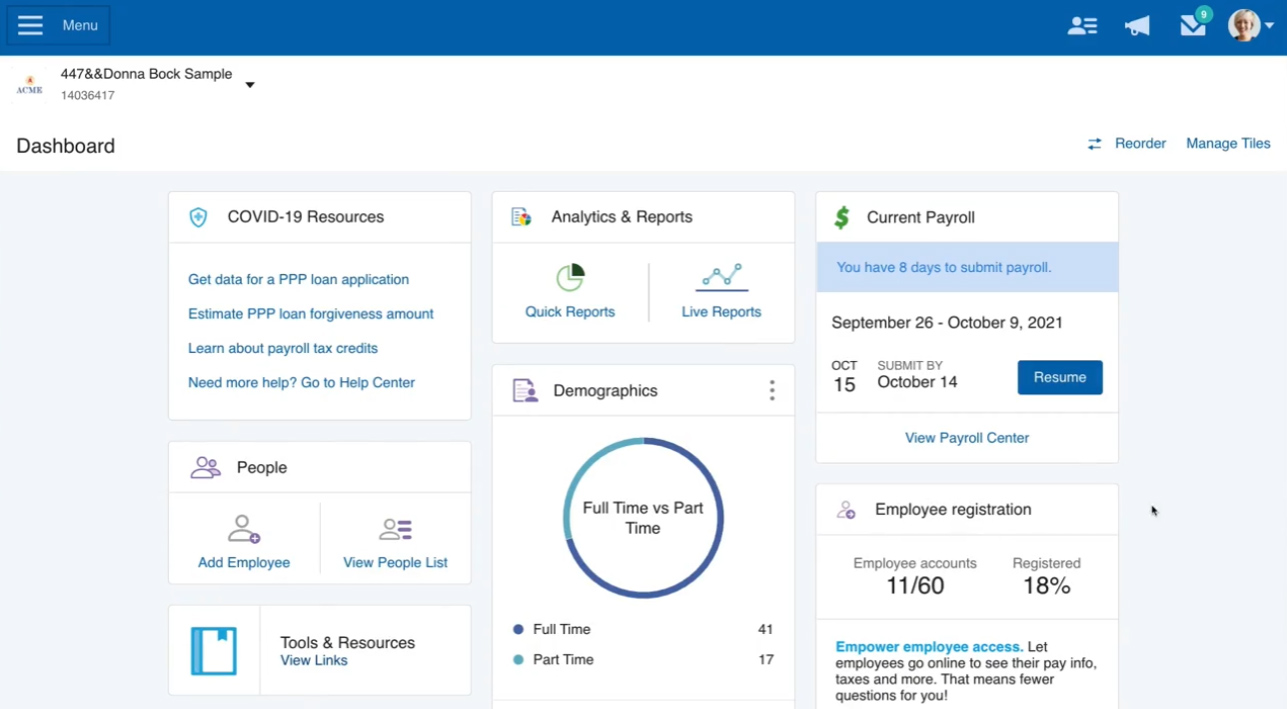
You can start and resume pay runs directly from Paychex’s main dashboard. (Source: Paychex)
- Paychex allows you to review, edit, and submit payroll from desktop computers and mobile devices (for iOS and Android).
- It has efficient pay processing tools and robust HR solutions, regardless of whether you have 10 employees or more than 500.
- It can manage federal, state, and local payroll taxes.
- Paychex offers online learning courses for employee upskilling.
Square Payroll: Best for Square POS Users

Pros
- Seamless integration with Square POS
- Low-cost contractor-only payroll plan
- Next-day direct deposits and instant payments available
- Unlimited pay runs
Cons
- Square Payments account required for next-day direct deposits and instant payments
- Four-day processing timeline for standard direct deposit
- Basic HR features only
- Customer code required for phone support
Overview
Who should use it:
Square Payroll is an ideal option for restaurant and retail business owners because of its seamless integration with Square POS, making it easy for you to capture, track, and process tip and commission payments. If you use Square POS to capture employee clock-ins and outs, then you can import time data into Square Payroll with just one click.
Apart from restaurants and retail shops, Square Payroll is great for small businesses that mostly hire contract workers, mainly because of its low-cost contractor-only plan—lower than QuickBooks Payroll and Gusto.
Why we like it:
We like how Square Payroll simplifies payroll management with its user-friendly interface and comprehensive features. It has automatic tax calculations, time-saving tools like automated time cards, and direct deposits. Square also has the flexibility to handle both employees and contractors. Additionally, its mobile app allows business owners to manage their payroll on the go.
- Pay employee and contractors: $35 per month + $6 per employee monthly
- Pay contractors only: $6 per person monthly
- Square’s “Instant Payment” feature enables you to offer next-day and even instant payments through its “Cash App”—provided you have a Square Payments account.
- Square Payroll comes with free online time cards that you can use to track employee attendance either through Square POS or the Square Team app.
- Square Payroll’s partnership with insurance carriers enables it to offer employee benefits like health insurance (via SimplyInsured), retirement plans (through Guideline), and pay-as-you-go workers’ comp (via Next Insurance).
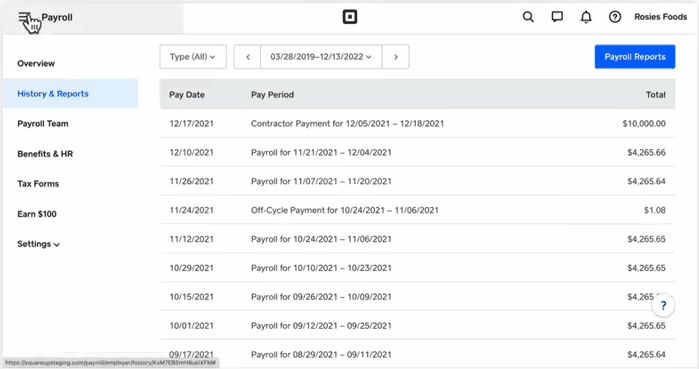
A look at Square Payroll’s pay runs (Source: Square Payroll)
Paycor: Best for Complex Salary Calculations

Pros
- Customizable pay grids
- Easy to set up and use
- Wide range of HR solutions (such as scheduling, time tracking, learning management, compensation planning, and engagement surveys)
- Unlimited and automatic pay runs
Cons
- Pricey for small businesses
- Starter plan with basic HR tools only
- Phone support unavailable on weekends
Overview
Who should use it:
Paycor is best suited for SMBs with complex payment processing needs for several reasons. It has a wide range of customization options, allowing businesses to tailor the system to their specific payroll requirements. Paycor can also handle multiple pay rates, shift differentials, complex bonus structures, and various pay frequencies. The platform supports both standard and nonstandard deductions, making it adaptable to diverse compensation models.
Why we like it:
Paycor offers a user-friendly interface that simplifies complex HR and payroll tools, making it easier for HR professionals and employees to use. It has strong compliance support, which helps businesses stay up-to-date with changing labor laws and regulations across different jurisdictions. Additionally, the software’s reporting and analytics tools provide valuable insights for data-driven decision-making, allowing businesses to better understand their workforce and labor costs.
Small business plans (those with up to 49 employees)
- Basic: Custom pricing
- Essential: Custom pricing
- Core: Custom pricing
- Complete: Custom pricing
Mid-market plans (businesses with 50 or more employees): Custom-priced
- Paycor has an intuitive employee self-service portal for accessing pay stubs and personal information.
- It has a robust time and attendance tracking integrated with payroll.
- Paycor also has a talent management suite including recruitment, onboarding, and performance management.
- Paycor’s flexible benefits administration and enrollment system streamline the often complex process of benefits selection and management for both employers and employees.
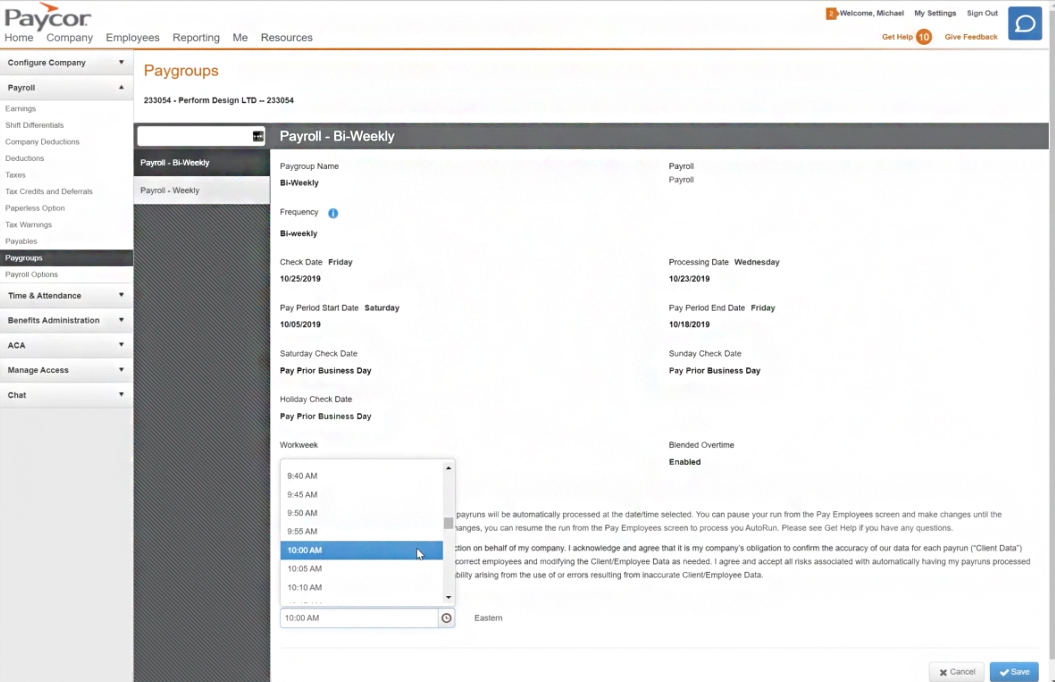
Paycor allows you to select the time you want it to run payroll automatically for salaried employees. (Source: Paycor)
Justworks: Best Reasonably Priced PEO

Pros
- User-friendly interface
- Reasonably priced PEO services
- Enterprise-level benefits packages from major health insurance companies
- 24/7 customer support via phone, email, chat, text, and Slack
Cons
- Medical, dental, and vision plans available only in Plus plans
- Time tracking as a paid add-on
- Limited third-party integrations
Overview
Who should use it:
Justworks is ideal for companies needing local hiring tools. Its robust features simplify the process of hiring and managing employees across different locations. Its platform provides location-specific compliance support, ensuring that businesses adhere to local labor laws, tax regulations, and employment requirements.
Why we like it:
Justworks offers transparent, all-inclusive pricing that scales with your business. We also like its diverse array of benefits options going beyond the standard health, dental, and vision insurance packages. This is very helpful for businesses looking to attract and retain top talent.
- Payroll: $50 base fee + $8 per employee monthly
- PEO Basic: $59 per employee monthly
- PEO Plus: $109 per employee monthly
Add-on solution
- Justworks Time Tracking: $8 per employee monthly
- International Contractor Payments: $39 per paid contractor monthly
- Payroll + Health Insurance: $8 per eligible employee monthly
- Employer of Record: $599 per employee monthly
- Justworks has a team of HR professionals that can provide free expert advice.
- Justworks has a wide range of nonstandard benefits options like health advocacy services, wellness perks, and fitness memberships.
- You can include expense reimbursement in the Justworks platform.
- Justworks offers an EOR product that partners with local experts in 100-plus countries to process payroll and hire local workers.
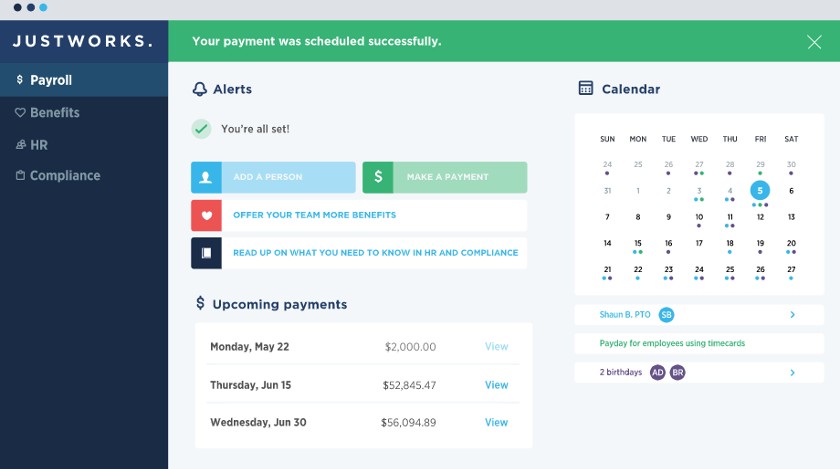
A screenshot of Justworks’ payroll dashboard (Source: Justworks)
Rippling: Best for Tech-reliant Companies
Pros
- Robust HR and IT products that can be purchased separately and as needed
- A bit more transparent pricing compared with ADP
- Integration with 500-plus third-party software
- IT tools that simplify the company computer/app provisioning and deprovisioning processes
Cons
- Core Workforce Management solution must be purchased before any other product
- Limited employee payment options
- Gets pricey as you add features
- HR help desk option with phone and email support costs extra
Overview
Who should use it:
Rippling is the only provider in this guide with IT solutions for managing company-issued computers and apps. It even integrates with more than 500 apps. This makes it ideal for companies that want to automate their computer provisioning and deprovisioning processes while streamlining essential HR and payroll tasks.
Why we like it:
We like Rippling because it combines HR, IT, and payroll into a single platform, streamlining operations and reducing administrative overhead. This integration allows for seamless onboarding and offboarding processes, automating tasks like setting up employee accounts across various software systems. Rippling’s strong emphasis on automation and customization caters to the dynamic needs of tech companies, enabling them to scale efficiently.
HR payroll plan: $8 per employee monthly, which includes access to Rippling’s core workforce management platform plus full-service payroll and time tracking solutions
Rippling PEO services: Call for a quote
Additional solutions*
IT tools (such as device, app, and computer inventory management): $8 per employee monthly
Benefits administration costs extra; pricing is based on your insurance broker.
*Pricing is based on a quote we received
- You get a full HR suite with robust employee management, benefits administration, time and attendance, and applicant tracking. It also has onboarding/offboarding automation and IT management tools.
- It also provides your staff easy access to online pay stubs and tax forms through its mobile apps (for iOS and Android devices).
- You don’t have to worry about payroll taxes because it automatically calculates and files federal, state, and local taxes for you.
- It has a PEO service that you can turn on or off any time.
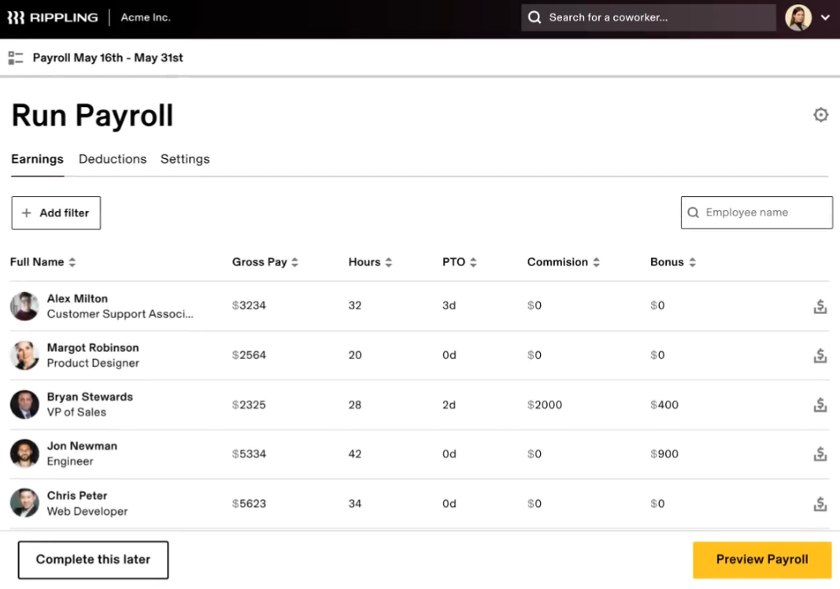
Rippling syncs all employee attendance, benefits, and pay-related data into its payroll module for easy processing. (Source: Rippling)
How We Evaluated the Top ADP Competitors
To determine the ADP alternatives that you should consider, we compared the top 14 payroll providers and focused on software that offers a robust set of payroll and HR tools vs just low-budget solutions. Note that ADP isn’t the cheapest payroll service on the market, and neither are many of its top competitors.
We also looked at several low-cost payroll software just in case you don’t need all of the features ADP offers or anticipate needing a huge upgrade soon. Then, we chose the top eight software that are most similar to ADP but are better in some aspects to help you decide which payroll solution is best for your company.
Click through the tabs below to read our full evaluation:
25% of Overall Score
We highly favored providers that have transparent pricing and multiple plan options. We also gave extra points to those that offer unlimited pay runs and have no setup fee.
25% of Overall Score
The best ADP competitors have essential HR features, such as onboarding, benefits options (aside from health insurance), and employee self-service portals. We also preferred providers that have experts on staff who help with compliance issues.
5% of Overall Score
Providers that received a 4-plus rating and have 1,000-plus user reviews on reputable third-party review websites get higher ratings on this criterion.
5% of Overall Score
Aside from the number of payroll reports, we also considered whether these premade templates are customizable. We also gave additional ratings if users can create new reports on the platform.
25% of Overall Score
We looked for features that make payroll processing more efficient and convenient for users. These features include local tax filings, contractor payments both local and international, and different payment modes (direct deposits, international wire transfers, etc.)
15% of Overall Score
Aside from an intuitive interface, we also favored providers that have an extensive knowledge base and quick problem resolution processes.
Frequently Asked Questions (FAQs)
In selecting the right payroll provider, you have to consider several factors, like your budget, business location, and the size of your company. It is also important to take stock of the payroll features (such as direct deposit payments and payroll tax filing services) that your business needs. Lastly, look for features that your business specifically needs, such as multistate payroll if your business operated in several states, time tracking capabilities, or ability to integrate with third-party time and attendance solutions if you have hourly workers. This prevents you from having to manually enter employee time data into payroll for processing.
If you don’t have an in-house HR staff or payroll accountant, then outsourcing your payroll makes sense. Most business owners who are not familiar with how to run payroll also opt to get payroll outsourcing services as it helps them save time while ensuring accurate payments to employees and compliance with pay-related laws.
In terms of years of experience, business size, and customer base, ADP is considered one of the largest payroll companies in the US. It has around 60,000 employees and over 70 years of experience handling payroll and HR. ADP also has more than 1 million clients—from small businesses to midsize companies and large enterprises. In addition, its product portfolio covers a wide range of HR solutions, such as US and global payroll, benefits administration, time and attendance, talent management, and PEO services.
Bottom Line
ADP is an excellent payroll service, but there are also several other great options to choose from depending on your requirements. All the ADP competitors on this list offer full-service payroll with tax filing services, direct deposits, onboarding and employee self-service, and tax and benefits calculations. Some primarily cater to small businesses, while others are more suited to a range of business sizes. HR support is included with most options but is limited under the most affordable plans.
Overall, we found Gusto to be the best ADP competitor for payroll services. It has the essential features that small businesses need, such as full-service payroll, multiple pay options, and expert HR support. It even has a variety of employee benefits you may want to offer, plus a reasonably priced plan for paying contractors—an option that ADP doesn’t offer. Sign up for a Gusto plan today.